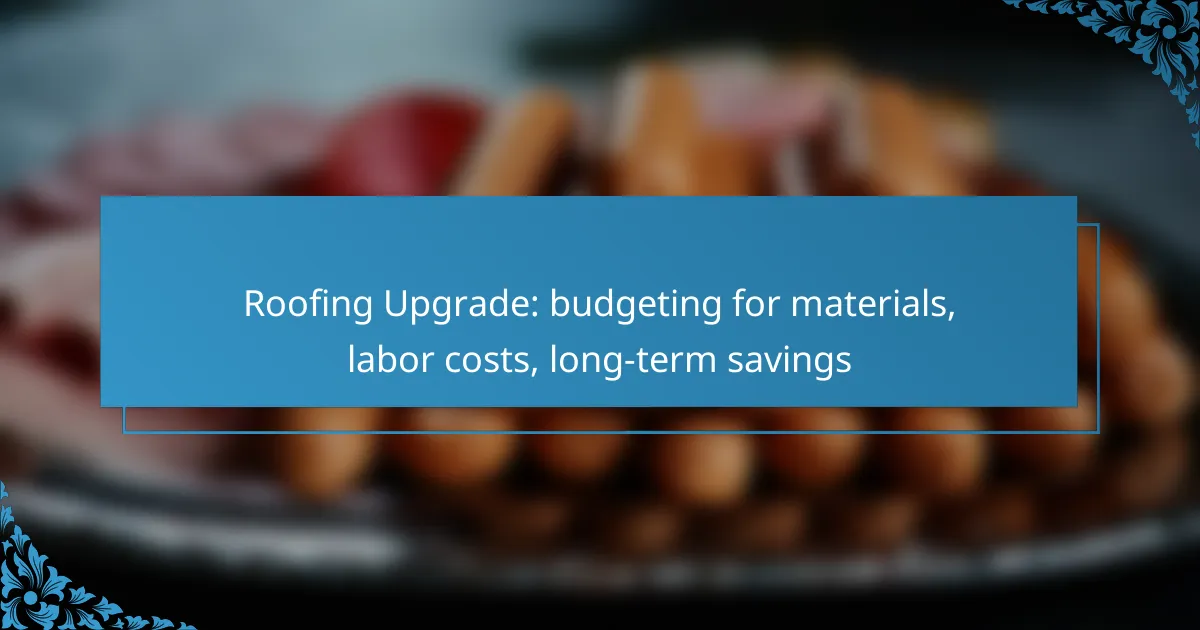Upgrading your roof is a significant investment that requires careful budgeting for both materials and labor costs. In Canada, the choice of roofing materials, such as asphalt shingles or metal roofing, can greatly impact your overall expenses and long-term savings. By considering the labor costs, which typically range from CAD 3 to CAD 7 per square foot, alongside the benefits of improved energy efficiency and property value, you can make an informed decision that pays off in the long run.
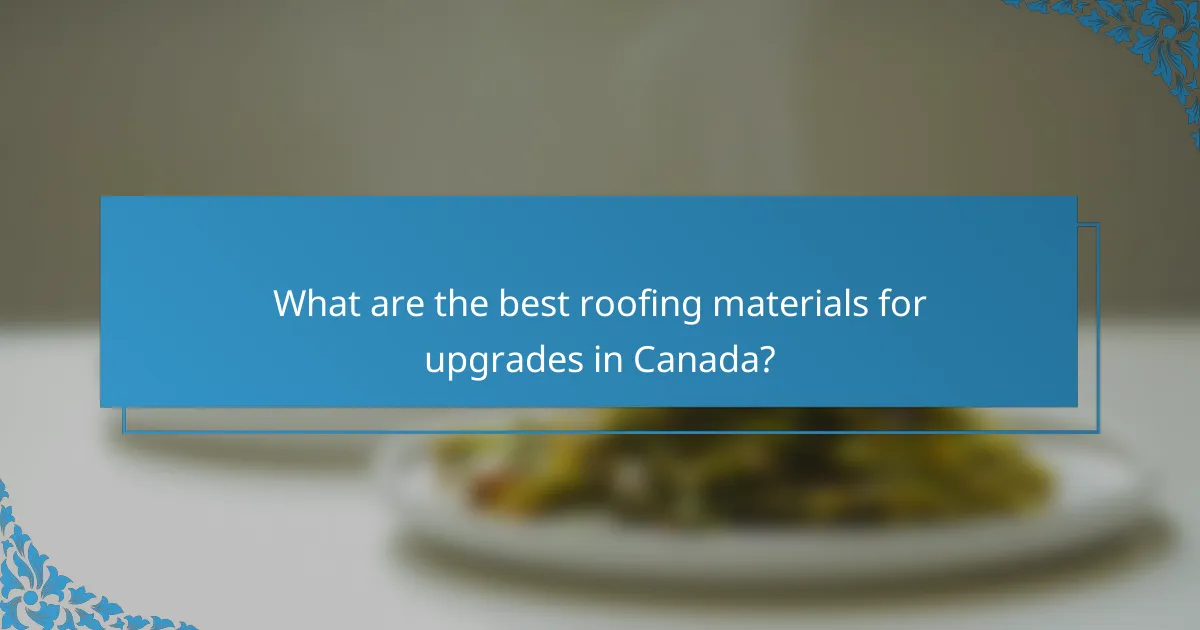
What are the best roofing materials for upgrades in Canada?
The best roofing materials for upgrades in Canada include asphalt shingles, metal roofing, wood shakes, slate tiles, and composite roofing. Each material offers unique benefits and considerations, making it essential to evaluate them based on durability, cost, and climate suitability.
Asphalt shingles
Asphalt shingles are the most popular roofing material in Canada due to their affordability and ease of installation. They typically cost between CAD 100 to CAD 150 per square (100 square feet) and can last around 15 to 30 years, depending on the quality.
When choosing asphalt shingles, consider the warranty and the climate in your area. Higher-quality shingles may offer better resistance to harsh weather conditions, which is crucial in regions with heavy snowfall or strong winds.
Metal roofing
Metal roofing is gaining popularity for its longevity and energy efficiency. Prices generally range from CAD 300 to CAD 700 per square, but they can last 40 to 70 years, making them a worthwhile investment over time.
Metal roofs reflect heat, which can help reduce cooling costs in summer. However, installation can be more complex, so hiring experienced professionals is advisable to ensure proper fitting and avoid leaks.
Wood shakes
Wood shakes offer a natural aesthetic and can last around 30 years with proper maintenance. They typically cost between CAD 400 to CAD 700 per square, depending on the type of wood used.
Keep in mind that wood shakes require regular maintenance and may not be suitable for all areas due to fire regulations. Ensure you check local building codes before installation.
Slate tiles
Slate tiles are known for their durability and elegance, often lasting over 100 years. However, they come with a higher price tag, ranging from CAD 800 to CAD 1,500 per square.
While slate is virtually impervious to weather, it is heavy and may require additional structural support. Proper installation is critical, so hiring a skilled contractor is essential to avoid future issues.
Composite roofing
Composite roofing materials, often made from recycled plastics and other materials, provide a balance between cost and durability. Prices typically range from CAD 300 to CAD 600 per square, and they can last up to 50 years.
These materials can mimic the appearance of wood or slate without the associated maintenance. Look for products with good warranties and ensure they meet local building standards for optimal performance.
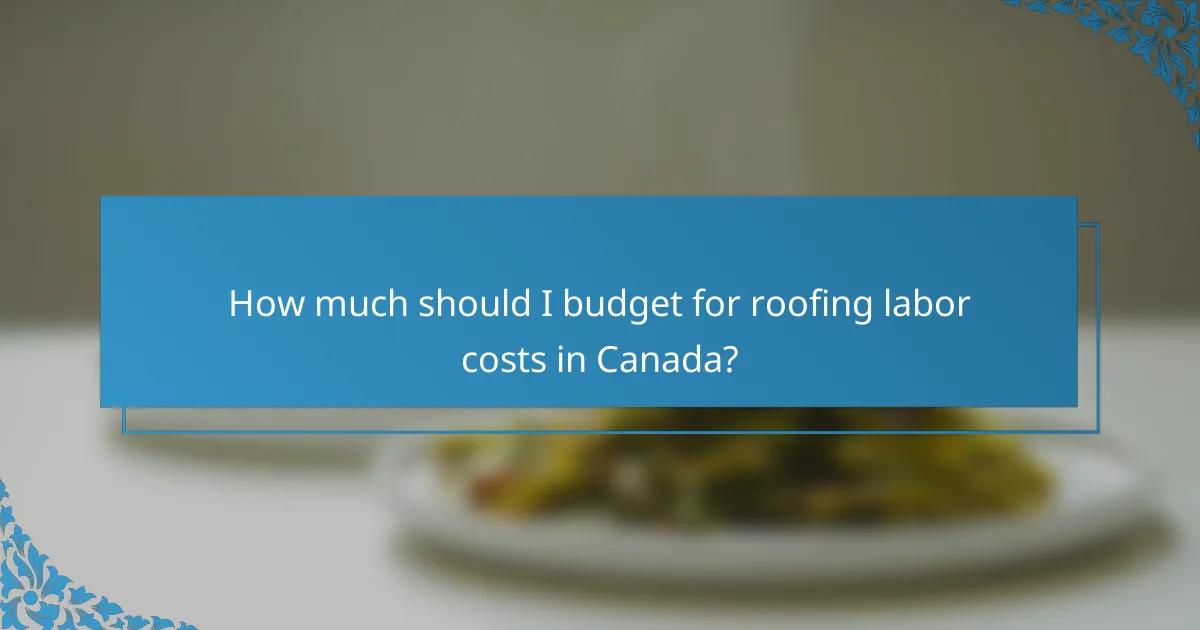
How much should I budget for roofing labor costs in Canada?
In Canada, budgeting for roofing labor costs typically ranges from CAD 3 to CAD 7 per square foot, depending on various factors. It’s essential to consider these costs alongside material expenses to get a complete picture of your roofing project budget.
Average labor rates per square foot
The average labor rates for roofing in Canada generally fall between CAD 3 and CAD 7 per square foot. This range can vary based on the type of roofing material, the complexity of the installation, and the region. For example, urban areas may have higher labor costs compared to rural locations due to demand and cost of living differences.
Additionally, specialized roofing services, such as installing slate or metal roofs, may incur higher labor rates. Homeowners should obtain multiple quotes to ensure they are getting a fair price for the labor involved in their roofing project.
Factors affecting labor costs
Several factors can influence roofing labor costs in Canada, including the roofing material chosen, the pitch of the roof, and the experience level of the contractor. Complex roofs with multiple angles or steep pitches often require more labor and expertise, leading to increased costs.
Seasonality also plays a role; roofing projects are typically more expensive during peak seasons when demand is high. Homeowners should plan their projects during off-peak times if possible to save on labor costs. Lastly, local regulations and permits may add to the overall expense, so it’s wise to factor these into your budget as well.
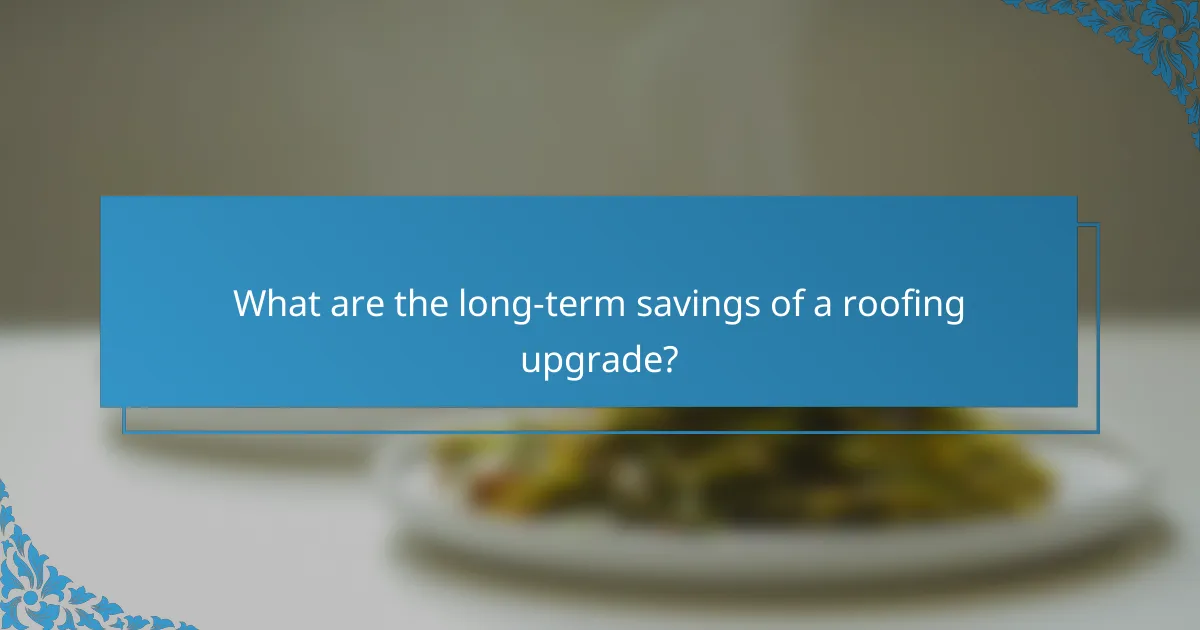
What are the long-term savings of a roofing upgrade?
A roofing upgrade can lead to significant long-term savings through improved energy efficiency, reduced maintenance costs, and increased property value. Investing in quality materials and skilled labor can yield financial benefits that outweigh the initial expenses over time.
Energy efficiency benefits
Upgrading your roof can enhance energy efficiency by providing better insulation and reflective properties. Modern roofing materials, such as cool roofs or those with high R-values, can reduce heating and cooling costs by 20-30% or more, depending on your climate.
Consider materials that meet Energy Star standards, as they are designed to minimize energy consumption. This not only lowers utility bills but also contributes to a more sustainable environment.
Maintenance cost reductions
New roofing systems often require less maintenance than older ones, leading to lower long-term costs. For instance, high-quality materials like metal or asphalt shingles can last 20-50 years, reducing the frequency of repairs and replacements.
Regular inspections and maintenance can further extend the life of your roof, but with a new installation, you may find that these costs decrease significantly. Avoiding common pitfalls, such as neglecting small repairs, can help maintain your roof’s integrity and performance.
Increased property value
A roofing upgrade can significantly enhance your property’s market value. Homes with new roofs often see a return on investment (ROI) of 60-70% or more, making it a smart financial decision when selling.
Potential buyers are typically willing to pay a premium for homes with updated roofing, as it signals fewer immediate expenses and a well-maintained property. This can be especially relevant in competitive real estate markets where curb appeal plays a crucial role in attracting buyers.

What permits are required for roofing upgrades in Canada?
In Canada, roofing upgrades typically require building permits, which vary by province and municipality. It’s essential to check local regulations to ensure compliance and avoid fines.
Building permits
Building permits are often necessary for significant roofing upgrades, such as replacing the entire roof or changing its structure. These permits ensure that the work meets safety and building code standards.
To obtain a building permit, homeowners usually need to submit detailed plans, including specifications of materials and construction methods. Fees for permits can range from a few hundred to several thousand Canadian dollars, depending on the project’s scope and location.
Local zoning regulations
Local zoning regulations can impact roofing upgrades by dictating height restrictions, materials allowed, and aesthetic guidelines. These rules ensure that renovations align with the neighborhood’s character and safety standards.
Before starting a roofing project, check with your local municipality to understand any zoning restrictions that may apply. Non-compliance can lead to costly modifications or even removal of the newly installed roofing.
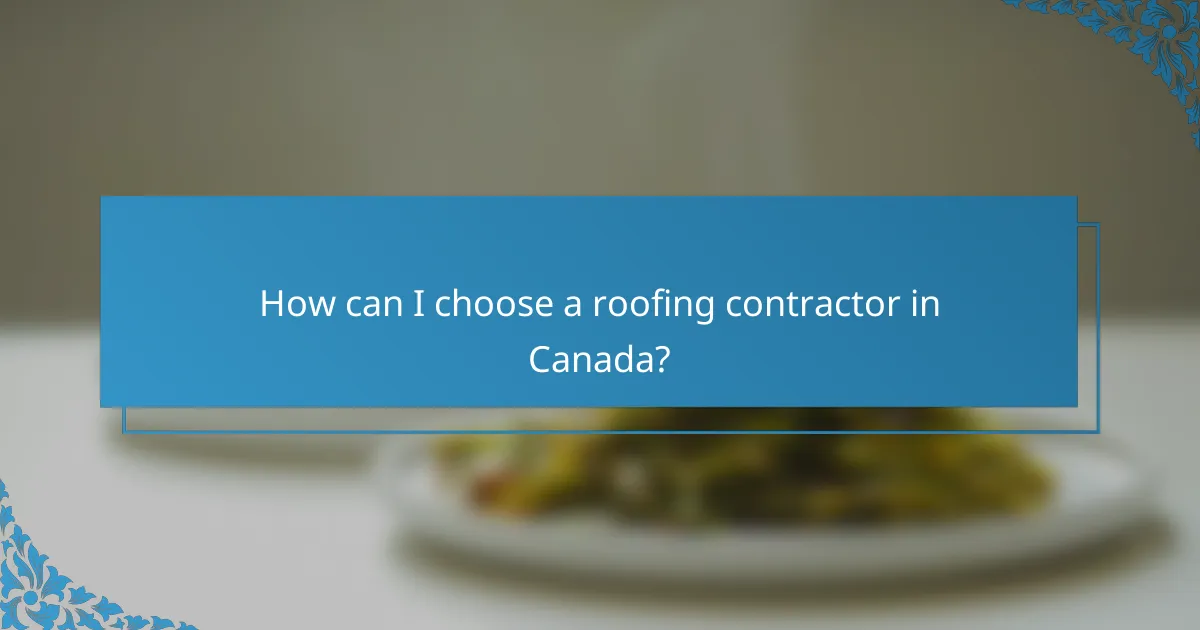
How can I choose a roofing contractor in Canada?
Choosing a roofing contractor in Canada involves verifying credentials, assessing reputation, and comparing costs. Focus on licensed professionals with good reviews and transparent pricing to ensure a quality roofing project.
Check for licenses and insurance
Ensure the roofing contractor holds the necessary licenses required by provincial regulations in Canada. This typically includes a business license and specific roofing certifications.
Additionally, confirm that the contractor has liability insurance and workers’ compensation coverage. This protects you from potential financial liability in case of accidents or damages during the roofing project.
Read customer reviews
Customer reviews provide insights into the contractor’s reliability and quality of work. Look for feedback on platforms like Google, Yelp, or local home improvement websites.
Pay attention to both positive and negative reviews, focusing on recurring themes such as punctuality, communication, and workmanship. This can help you gauge the overall satisfaction of previous clients.
Get multiple quotes
Obtaining multiple quotes from different contractors is crucial for understanding the market rate for your roofing project. Aim for at least three estimates to compare pricing and services offered.
When reviewing quotes, look for detailed breakdowns of material and labor costs. Be cautious of significantly low bids, as they may indicate subpar materials or workmanship.

What financing options are available for roofing upgrades?
Several financing options can help homeowners afford roofing upgrades, including home equity loans, personal loans, and financing through contractors. Each option has its own benefits and considerations, making it essential to evaluate which best suits your financial situation and project needs.
Home equity loans
Home equity loans allow homeowners to borrow against the equity they have built in their property. Typically, these loans offer lower interest rates compared to unsecured loans since they are secured by the home itself. Borrowers can usually access a percentage of their home’s value, often ranging from 70% to 90% of the equity.
When considering a home equity loan for roofing upgrades, it’s important to assess your ability to repay the loan. Monthly payments will be required, and failure to repay could result in losing your home. Additionally, be aware of any closing costs or fees associated with the loan, which can add to the overall expense.
Before proceeding, shop around for the best rates and terms from different lenders. Comparing offers can help you secure a favorable deal, potentially saving you hundreds or thousands over the life of the loan.
